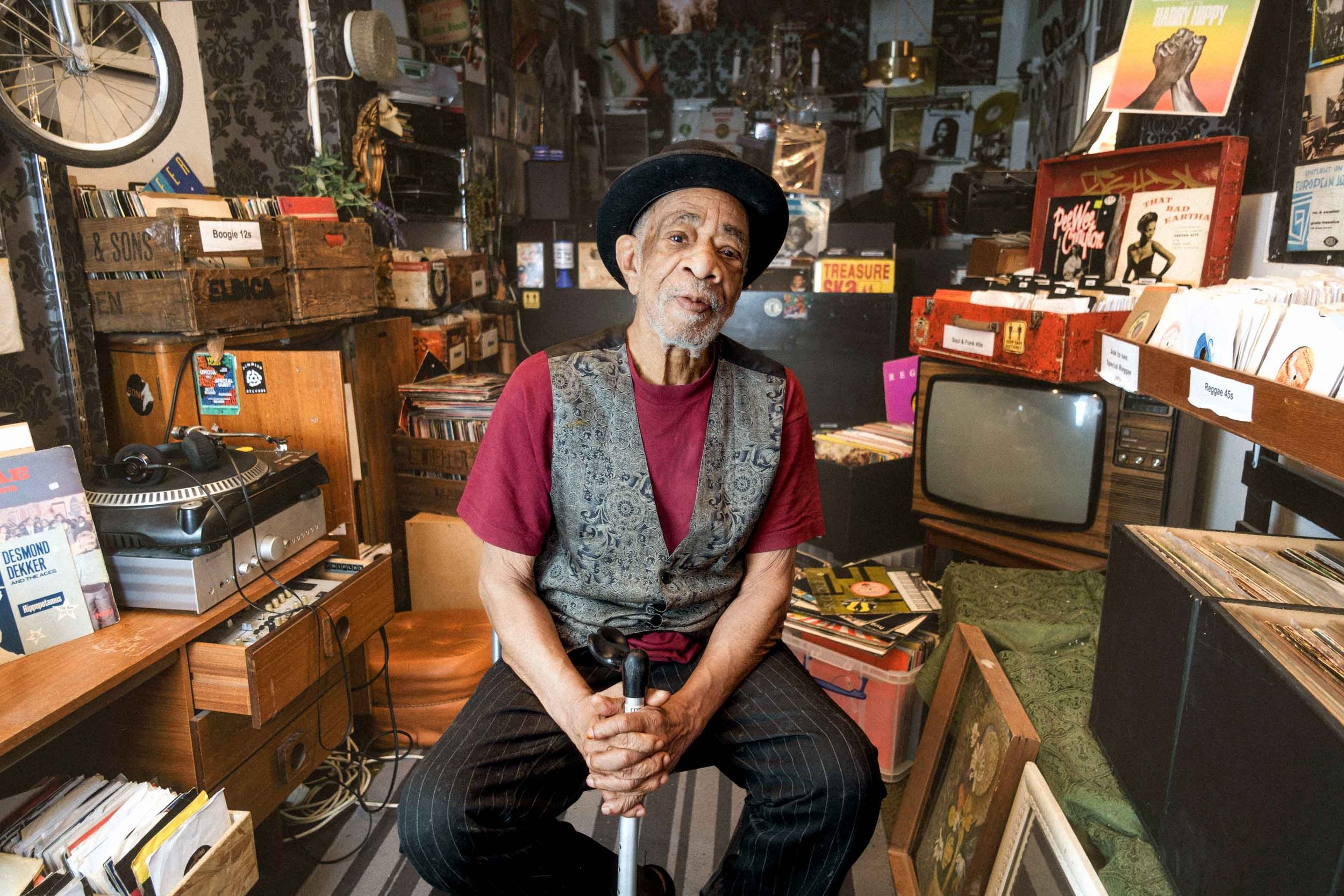Newton Dunbar
Newton Dunbar / The Four Aces
“I came here from Jamaica in 1956 and it was my first time away from home. There was nothing for me in Jamaica. I had just turned 19 and instead of being under my parents’ feet I decided to come to England. There were seven of us in the family. My oldest sister went to the Juilliard School of Music in America. My friend was giving me glowing accounts of the freedom he had and how things were quite exciting here in the UK.”
“My dad got his big old trunk out, which was more like a wardrobe, and they decided to pay for my fare to come to England. I was going to be the recipient of my friend who was there to take me in initially and give me my first steps, which he did. I got myself a job at the time even though there was hardly any work. But in that period the railways were advertising for people. I went and I got the job at Kings Cross, and it was on what they call the foot plate it was the steam engine. So, there I was on the railway, and I remember the first wages that I earned were six pounds six and nine and that’s how I started. I was with the railways for five years on the steam engines.”
“In that period there were a few of my friends who we used to go out together to the blues dance. Then one day we found this place in Highbury (north London) that had a jukebox inside. It was the basement of a guesthouse in Highbury Grove, and we use to go there because music attracted us to the clique. The guy that owned these premises he got fed up with us sitting around. He asked if we would like to rent it from him, so we did. There was four of us from this gang and we agreed that we would take it over.”
“We had a bit of money in our pocket and first we decided a name and because there was four of us, there was a brand of cigarettes in Jamaica that we all knew - The Four Aces. We said yeah that was a popular brand of cigarettes and there is four of us, let’s call it The Four Aces. The club continued roughly for seven or eight months and then it got very crowded, and we then started looking around for larger premises. There was advertised this place in Dalston, this place was called Club C and was owned by a guy called Charlie Collins who owned the lease on this place in Dalston and he wanted a thousand pounds for it. So we established the club in Dalston 1966.”
“I was enchanted as most people are by music, especially when it’s played on a level that you can understand. The level that I could understand was music for the ordinary person. Some of it came from Jamaica. Now Jamaica was having a music revamp, and they were gifted people. Some of them were making recordings and of course a night club is the obvious place where they wanted their music exposed.”
“Things were up and down but we were fortunate in the sense that someone like Desmond Dekker performed. By this time, we started getting music possibilities by an agency called Commercial Entertainment. This agent would send us some possibilities and we started having some very good artists. We had people like Jimmy Clif and artists of repute like Jimmy Ruffin and other very famous people. Ben. E. King came three times to The Four Aces during that time and he is a top American star in those days. So was Jimmy Ruffin… we had a pick of some of the best and we progressed. Apart for that the main music which we could afford, the rest was produced by sound systems and the sound system culture is a very intricate part of the club because it was music that was continuous from the moment we opened.”
“Building my club was very hard and I faced many barriers, but I have no time for self-pity. We had a nightclub license, but it was a very tough time when the council and the police saw that what I was trying to do was black orientated, black owned because of course that demon of prejudice filtered in and everybody was prejudice during those days, whether they were official or not. They weren’t blatantly prejudice but they created difficulties to make sure you do not progress. And the police when they found out we was there for a year, they tried to close us down. But I somehow managed to evade that happening and they tried, and in combination with the council were very powerful and they took me to court fourteen times. For some reason or another I managed to go through a court procedure and won and managed to survive, as well as the club. They would try other tactics like a pretend raid, they would come in and of course black people who had experience with the police abuse before would march straight out.”
“The only clubs in England at the time were the ‘tea dances’ near the West End. Whereas the people who came to this club, were more used to all different types of music. Especially soul music from America, well made and mixed in with the music that came from Jamaica which is where most of the people started off coming. So you know, it kind of progressed in the sense that they were more or less inventing music from Jamaica. And the more the music came the more it became popular so that was a good thing.”
“During those days, Black music was not accepted in the system. There was no radio station that would play any form of Black music. But then came along Desmond Dekker, who went into the British charts. By then we’ve gone into the year 1969. He went into the British charts with a song called “The Israelites” – which became number one in the charts. And he became the first Reggae superstar. I had a British number one with Desmond Decker. He was number one in the British charts. He appeared live on the stage at The Four Aces.”
“The Four Aces did play a part (in breaking down barriers) and eventually black and White people used to go there and there was no problems. The Four Aces didn’t have fights, nobody got stabbed or what have you. There used to be bits and pieces but probably no more so than English pubs. In fact there was some kind of a wonderment as to how the behaviour was kept above what expected because even in the pubs sometimes there used to be fights during those days. You know it didn’t affect us in a detrimental way because in the end they had to give up after we were taken to court fourteen times over the years and you know they are trying to chip away at you. But they never succeeded. In the club from the front door to different sections like the bar etc I actually did introduce electronics that even the police did not have. So I could sit in my office and I could see the whole space.”
“The late 1960’s up to the 1970’s was my favourite time running The Four Aces. It was a period when people came out. They had every confidence of what they wanted and what they wanted to do and even through the forces that be tried to intervene and tried to make it difficult, they didn’t succeed. Don Letts the cultural historian speak of the relevance of my club. The Four Aces, we were the original and our space was a very special space. In the late 80’s The Four Aces became The Four Aces incorporating Labyrinth and this was part of my destiny to be able to do that. A very mixed crowd, sometimes over seven hundred people, sometimes eight hundred, that was the Labyrinth crowd, you know, it was phenomenal.”
“The Four Aces was a great stress reliever and allowed people to dance. They found freedom in movement. There were very few fights in my club. As a crowd, they learned about themselves, and what they were doing with the music was positive.”

